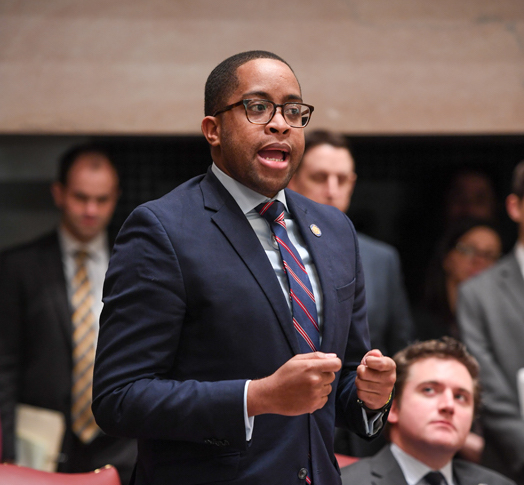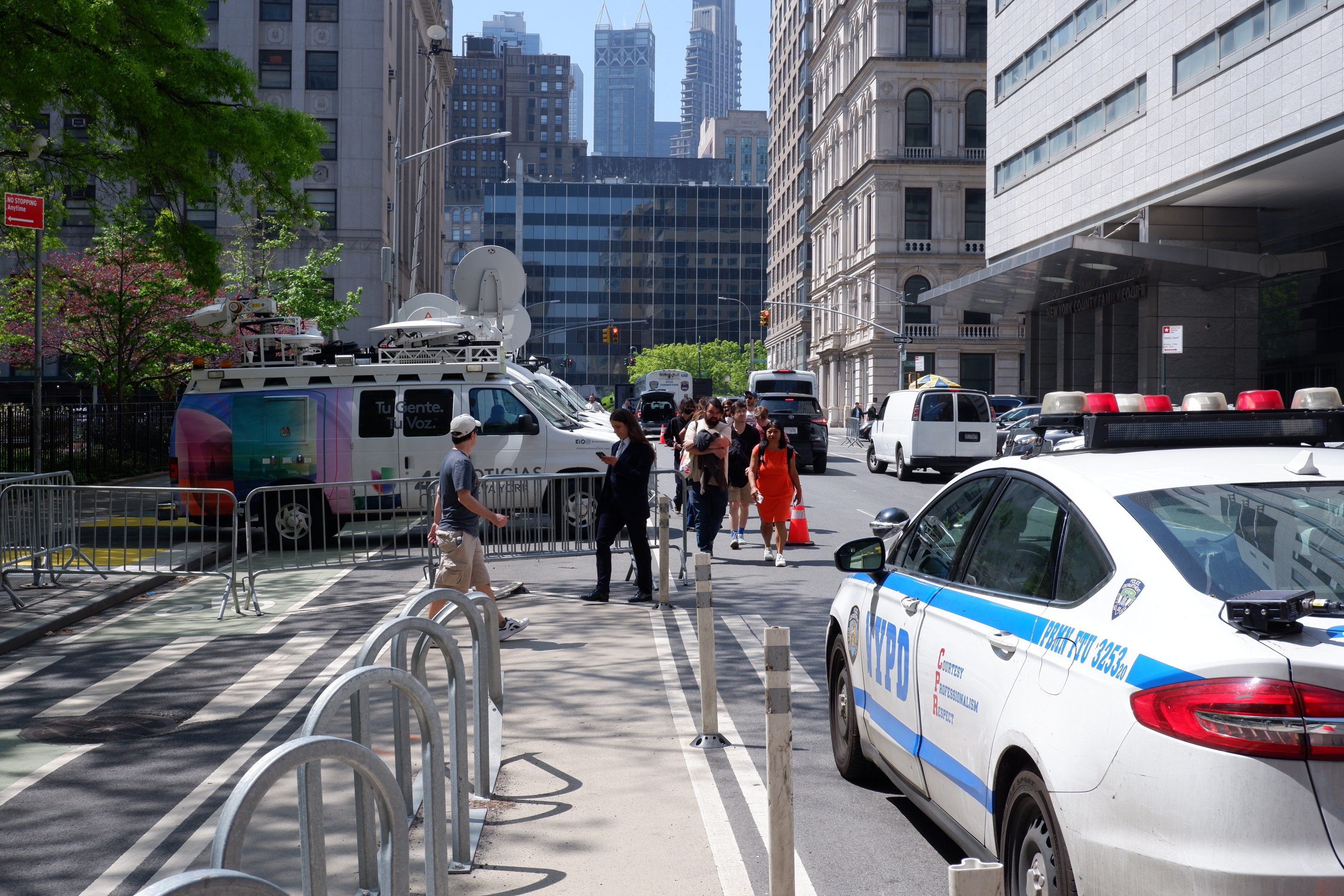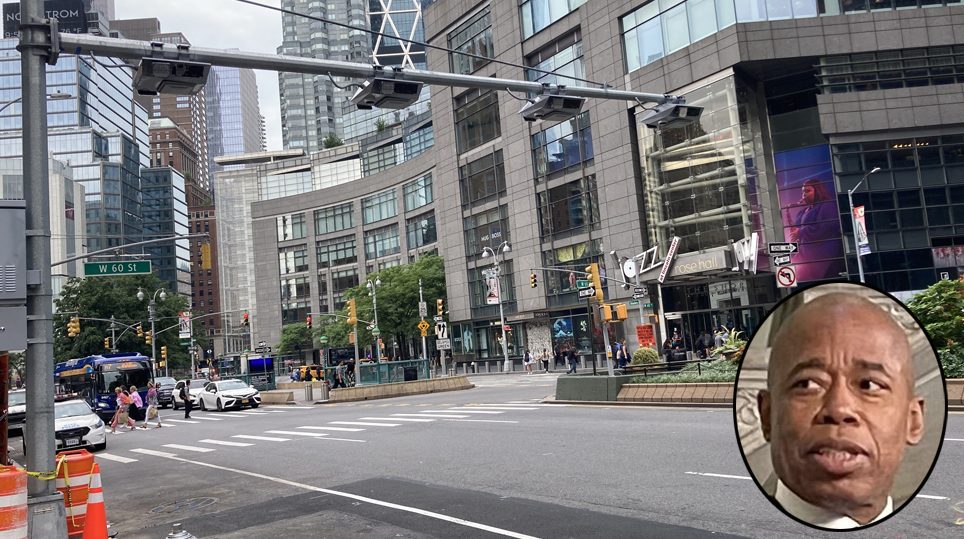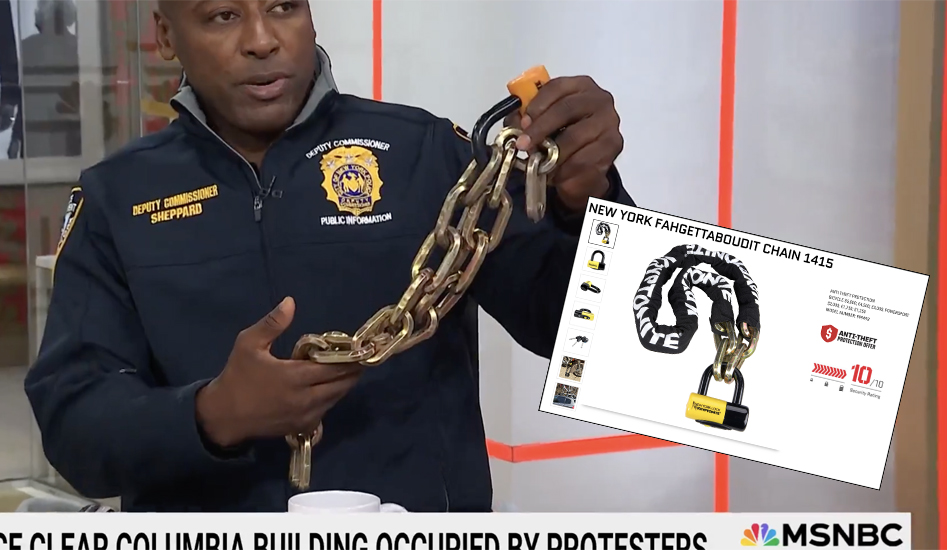State Sen. Zellnor Myrie on Gentrification, Master Plans and the Inherent Bias of Cops
6:41 PM EDT on October 29, 2019

State Senator Zellnor Myrie. Photo: Courtesy Zellnor Myrie
This has been a bloody year for cyclists across the city, but especially in Brooklyn, where 17 of the city's 26 cycling deaths and two dozen pedestrian killings have occurred. Of the cyclist deaths in Brooklyn, 13 of them have happened in areas of the borough where the city hasn't added safe biking infrastructure, even as city officials are encouraging people to ride. At the same time, cycling is on the rise among people of color, according to State Senator Zellnor Myrie. So it all adds up to an inequitable, dangerous situation. To plot the way forward, Myrie, a Democrat, will host a forum in Crown Heights on Wednesday night to "learn ... how we can fight to make biking safe and accessible to everyone in our community," he said. Before the forum, Myrie spoke with Streetsblog's Dave Colon about what the future of Vision Zero enforcement should look like.
Dave Colon: Brownsville, which is in your district, has more injury-causing crashes there than the much-larger Upper West Side, partially because Manhattan gets a lot of the bike infrastructure. Meanwhile, some communities worry that more bike lanes will cause gentrification. Do they?
Zellnor Myrie: It is really important for us, particularly in this context, to recognize that perception, can oftentimes trump reality, even if that's an often-used trope. And I think that in a neighborhood where folks are being displaced, any incoming new infrastructure, whether that be a physical building or a major change in traffic like a bike lane or some or some other mechanism, [it's] going to trigger that that fear of displacement. The difficulty is, we never have the actual conversation about whether or not this has anything to do with gentrification and whether or not this is a mechanism and a tool that has been used to push people out. I think that there are very concrete things that we can point to as forces of that. And I think because there is a natural fear and response to things that are new in the neighborhood, that the issues become unnecessarily conflated. ... It takes a lot of communication in order to hedge against the things that start percolating up and before they get out of control. There really needs to be a process by which the planning is done with the community and not at the community. I think you meet the biggest resistance when the community feels like they're being planned at and not with.
DC: But you're on board with the mayor's "Green Wave" plan or Corey Johnson's "Streets Master Plan"? Or will they make your constituents would put upon because both are kind of saying, "We have a huge vision no matter where you are, we have these connections that we want to make."
ZM: Let's take this in the transportation context. We really shouldn't be doing it piecemeal. And part of why there's difficulty and disparities, is that we have approached transportation planning in [a] somewhat haphazard way and just being reactionary. It hasn't been something that's comprehensive, even though this is New York City and most of us travel outside of our neighborhood on a pretty regular basis. So we should be planning in that way. But added to that, again, is this notion of being inclusive. The first piece is coming up with a comprehensive plan so that the person who's in a transit desert has a safe and sound route to get to a major hub. But you also should be talking to the folks in that neighborhood about that transit desert, about improving the public transportation, and also speaking with the folks who have been in that community about how they think that they should be best utilized as well. Because even if you have the most meritorious plan, the best plan we've ever seen and it will take us into the 22nd century, if you have not communicated and worked with the folks who will be most impacted, then I think it is doomed for failure.
DC: So when we talk about communication, what can we do when elected officials argue for their own needs as drivers even when very few people in their district drive?
ZM: As an elected official, you are, of course responsible for representing the entirety of your community. And there is no elected official in the city that has a homogenous district where everyone is of the same view. And I think that it is incumbent upon those of us who have the honor of serving to ensure that both the majority and and minority voices have a full hearing. We all bring our perspectives to the table. I don't have a driver's license. I am a huge consumer of public transportation. And so I bring that that perspective to the conversations that we have around transportation. But you know, I am sympathetic both to the folks who are cyclists because I understand there is a life-and-death issue on protecting our cyclists. And I understand our drivers, particularly those who actually need to drive. We need to be very careful, certainly as elected officials, to protect against our own biases. And I think this is the best way to do that is elevate all the voices in the conversation.
DC: Yeah, but it seems like a lot of elected officials drive — and then get the idea that everyone else must be doing it, too. And as a result, they only listen to people who complain about traffic. Even the mayor last year said, "We're New Yorkers, we are always concerned about parking." What the heck, man? Who were Mayor de Blasio's "we" in that sentence?
ZM: Part of being on this side of things is, is there are going to be folks that you hear from in your office about particular issues because this is something that's most pressing to them, and they're going to be most passionate about that particular issue. And we are sometimes tempted to think that becauseI've heard from this particular group, this must be how things are all over, when in truth, it is next to impossible to hear every single issue that every person has in your district. There's a similar dynamic happening on transportation in my district. Most people don't drive. And that is a fact. But there is this notion from drivers who feel attacked by a particular conversation, there's a notion that they are under siege by most folks who, in fact, take public transportation and don't speak on these issues at all. We really have to guard against our natural instinct to have assumptions, and really be objective in looking at how we make our transportation policy.
DC: And speaking of one side of this debate, do you have any feelings on whether there are places in your district where free parking spaces should be removed or turned into paid parking?
ZM: To be frank, I haven't given thought to specific places where we should be doing this. The bike forum is one of a number of forms we're going to be doing around transportation, and I was hoping to kind of get the temperature of the community in order to start making those decisions and recommendations. You know, we have a really good opportunity politically, because there's going to be a lot of turnover on the City Council, the borough presidency and the citywide offices in short order [Election of 2021]. And so this period allows the community to present what they want done to the folks who want to be in these roles, since the DOT primarily responds to city elected officials. I'm hoping that, you know, these series of forums that we're putting on will help crystallize those visions.
DC: Do you think the NYPD does a good job of enforcing Vision Zero stuff? Or is done in a racially biased way?
ZM: So as you know I care very deeply about law enforcement's relationship with the communities I represent. And I'm always hesitant to encourage more enforcement, because the unfortunate reality is that in most instances where enforcement is increased, it is done so in a disproportionate manner, affecting folks of color. But I do think that if Vision Zero is going to be successful, the enforcement has to be across the board. And there can't be any particular group that escapes enforcement on a regular basis, or that is the brunt of that enforcement. Because then not only do you have the vision impeded because of the uneven enforcement — and the behavior that you're trying to discourage is not in fact discouraged — but any group that is being disproportionately affected won't engage with the vision as you'd like.
DC: I was just on Coney Island Avenue talking with people about traffic violence, and they were saying "The cops never do any enforcement here." You think, "Hmm, that's bad," but on the other hand, the NYPD has a pretty bad track record on traffic enforcement. So is the answer automated enforcement, so cops are less likely to pull over black and brown people?
ZM: Yeah, and correct me if I'm wrong, but we've seen for instance, with with the speed cameras, they really do slow drivers down. There is evidence that automated enforcement gets at the behavior that we're trying to discourage. And it is a pretty objective factual assessment of whether or not a violation occurred, it doesn't have a built-in history and the built-in biases that exist with our law enforcement, so that is something I would very interested in this exploring.
Sen. Zellnor Myrie's Bike Equity Forum will take place on Wednesday, Oct. 30 from 6 to 8 p.m. at Brightpoint Health, 803 Sterling Pl. between Rogers and Nostrand avenues.
Dave Colon is a reporter from Long Beach, a barrier island off of the coast of Long Island that you can bike to from the city. It’s a real nice ride. He’s previously been the editor of Brokelyn, a reporter at Gothamist, a freelance reporter and delivered freshly baked bread by bike. Dave is on Twitter as @davecolon. Email Dave Colon at dcolon@streetsblog.org
Read More:
Stay in touch
Sign up for our free newsletter
More from Streetsblog New York City
Stockholm Leader’s Message to NYC: ‘Congestion Pricing Just Works’
"In Stockholm, people really thought that congestion pricing would be the end of the world, the city will come to a standstill, no one would be able to get to work anymore and all the theaters and shops would just go bankrupt. None of that happened."
Friday’s Headlines: Trump Trial Trumps Safety Edition
Is anyone going to bother to fix the dangerous mess on the streets and plazas around the Trump trial? Plus more news.
Adams Offers Bare Minimum to Seize Congestion Pricing’s ‘Space Dividend’ Opportunity
The mayor's list of projects supposedly meant to harness congestion pricing's expected reduction in traffic is mostly old news, according to critics.
OPINION: Congestion Pricing Will Help My Family Get Around As We Navigate Cancer Treatment
My partner was recently diagnosed with cancer. Congestion pricing will make getting her to treatment faster and easier.




